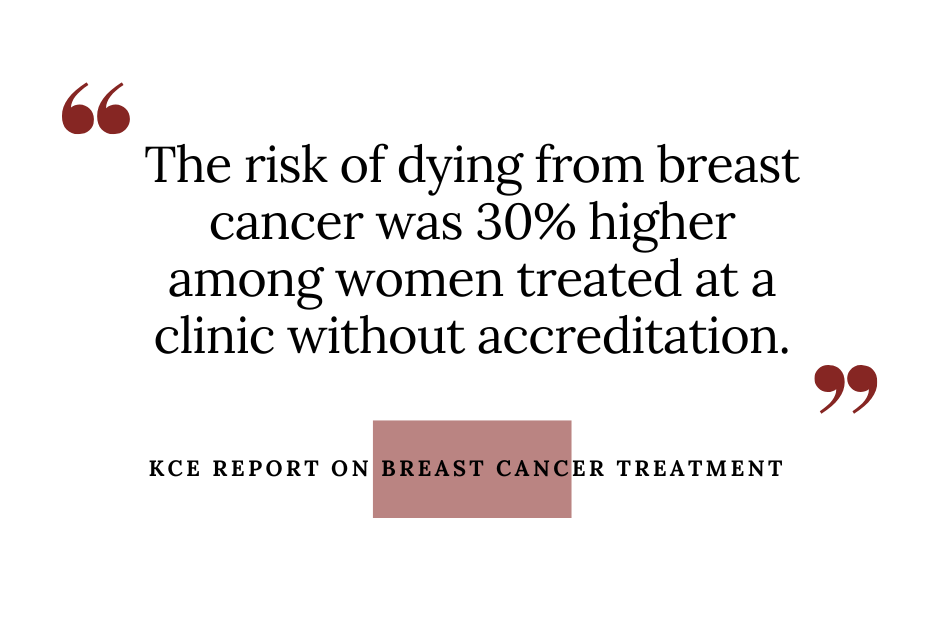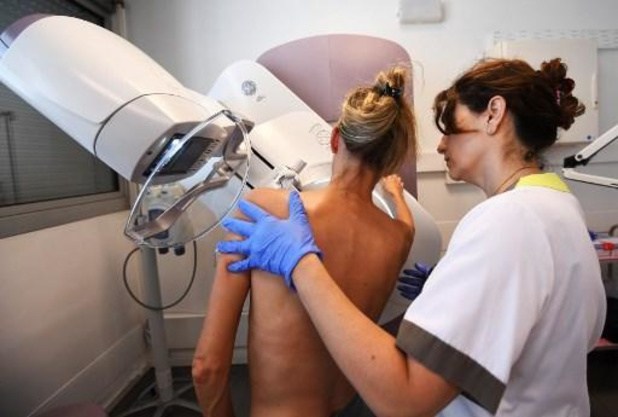Belgium's healthcare system is up in arms following a new study which has shown that patients treated in breast cancer care clinics without official accreditation have a significantly higher chance of dying from the illness.
The study by the Federal Health Care Knowledge Centre (KCE) focuses on the year 2018 when one-fifth of women with breast cancer were being treated in a clinic without accreditation. It found patients who seek treatment at these clinics have a "disturbingly higher risk" of dying compared to women treated at an accredited breast clinic.
"It does matter that patients with breast cancer are treated in an accredited breast clinic. The results indicated that the risk of dying from breast cancer was 30% higher in women treated at a clinic without breast cancer accreditation," the KCE report read.
These findings are not new. A previous KCE report warned in 2012 that there was an increased risk of dying from breast cancer in hospitals with lower numbers of new diagnoses – which is the case in unofficial clinic. Until today, the law does not prohibit breast cancer treatment outside recognised breast clinics.
How do the clinic differ?
Belgium set the approval standards for breast cancer clinics, where an accredited clinic is required to have a multidisciplinary team of specialists, with a minimum activity volume of 125 new diagnoses per year. This should ensure that the (para)medical teams can build and maintain sufficient experience, but also that care can be organised in a cost-effective way.
In the clinics that are not recognised by the government, so-called "satellite breast clinics," the minimum volume was set at 60 new diagnoses per year, meaning women have no guarantee of the (para)medical framework and facilities provided by law in recognised breast clinics. Satellite breast clinics, however, must have a formal cooperation agreement with an accredited clinic.
The study highlighted that, in fact, there are discrepancies between the types of clinics.
The 'volume' effect (i.e. how many new diagnoses per year) is an important factor. Women with invasive breast cancer treated in a low-volume centre (fewer than 60 new diagnoses per year) had a 44% higher risk of dying from the illness. The risk was 30% higher for women treated in a medium-volume centre (60-124 new diagnoses per year) compared with those treated in high-volume centres (125 or more new diagnoses per year).
A second worrying finding was that in 2018, 20 out of 52 accredited breast clinics failed to meet the threshold for 125 new diagnoses per year. Three of these clinics did not even reach a volume of 60 new diagnoses per year. Among satellite breast clinics, three out of 13 centres also failed to reach the volume of 60.
Responses to report
Following the report, the KCE called for quick and adequate action, such as further reorganising the supply of care. "Each of the more than 10,000 patients diagnosed with breast cancer each year in Belgium must receive quality care. It can no longer be that survival rates depend on which centre you end up in," the report concluded.
Kom op Tegen Kanker, the organisation that stands up for patients' right to the best treatment and care in Flanders, warned these figures were "particularly worrying," and called on the government to intervene to ensure that every breast cancer patient receives the best care."
In response to the report's findings, Health Minister Frank Vandenbroucke, who said the conclusions of the report are "crystal clear," noted that, in future, treatments for breast cancer should only take place in recognised clinics.
Related News
- Flemish healthcare sector wants to get rid of face masks
- Brussels hospital uses AI to detect acute conditions more quickly
Belgium now has 72 accredited breast clinics. According to Vandenbroucke, numerous other clinics continue to wrongly give the impression of being recognised despite making too few diagnoses per year, as well as lacking the framework that recognised breast clinics do provide, such as a breast nurse or a psychologist.
He announced that breast cancer treatments will soon only be reimbursed if they take place inside one of these approved breast clinics. The unrecognised hospitals will also not be allowed to draw up a breast cancer treatment plan or operate in the future.
Vandenbroucke clarified that the end of reimbursement only concerns the elaboration of the treatment plan as well as breast cancer surgery, meaning follow-up treatments such as chemotherapy or radiotherapy may continue to be reimbursed under certain conditions when performed in non-accredited clinics.
The Belgian health minister also called on the affected hospitals to stop spreading unclear or misleading advertisements, and asked doctors to refer patients only to recognised breast clinics.

